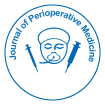
Journal of Perioperative Medicine
Open Access
ISSN: 2684-1290

ISSN: 2684-1290
Opinion Article - (2024)Volume 7, Issue 4
Enhanced Recovery After Surgery (ERAS) is a patient-centered, multidisciplinary approach designed to optimize perioperative care, reduce recovery time and improve outcomes following surgery. By implementing evidence-based practices, ERAS protocols aim to minimize the physiological and psychological stress associated with surgery, ultimately leading to faster recovery, fewer complications and shorter hospital stays. This article moves into the principles of ERAS, its components, and the impact it has on modern surgical practice.
Preoperative phase
The preoperative phase is important for preparing the patient both physically and mentally for surgery. ERAS protocols emphasize patient education, optimization of health and psychological preparation.
Patient education: Patients are provided with detailed information about the surgical procedure, the expected recovery process and the role they play in their own recovery. This empowers patients to actively participate in their care and adhere to the ERAS protocol.
Preoperative optimization: The patient’s medical condition is optimized before surgery. This may involve managing chronic conditions such as diabetes or hypertension, improving nutritional status, and encouraging smoking cessation. Prehabilitation, including physical conditioning and respiratory exercises, may also be recommended.
Shortened fasting: Traditional fasting guidelines that require patients to quit food and drink for extended periods before surgery have been revised. ERAS protocols allow patients to consume clear fluids up to two hours before surgery and a light meal up to six hours before. This reduces preoperative discomfort and helps maintain metabolic stability.
Intraoperative phase
The intraoperative phase focuses on minimizing surgical stress and reducing the risk of complications.
Minimally invasive techniques: Whenever possible, minimally invasive surgical techniques, such as laparoscopic or robotic surgery, are preferred. These approaches reduce tissue trauma, blood loss, and postoperative pain, leading to faster recovery.
Multimodal analgesia: Pain management in ERAS protocols avoids the dependence on opioids, which are associated with significant side effects like nausea, constipation and respiratory depression. Instead, a multimodal approach is used, combining different classes of analgesics, such as Non-Steroidal Anti- Inflammatory Drugs (NSAIDs), local anesthetics and regional anesthesia techniques, to provide effective pain relief with fewer side effects.
Goal-directed fluid therapy: Fluid management is carefully reduced the patient’s needs to avoid both under hydration and fluid overload, which can impair organ function and delay recovery. Goal-directed therapy uses advanced monitoring techniques to optimize fluid administration during surgery.
Postoperative phase
The postoperative phase is critical for ensuring a smooth and rapid recovery. ERAS protocols prioritize early mobilization, resumption of normal diet and effective pain management.
Early mobilization: Patients are encouraged to get out of bed and move around as soon as possible after surgery, often on the same day. Early mobilization reduces the risk of complications such as deep vein thrombosis, pulmonary embolism and muscle atrophy, while also promoting faster return of bowel function.
Early nutrition: Traditional practices of delaying oral intake until bowel function returns have been abandoned. ERAS protocols encourage the early reintroduction of oral nutrition, often within hours after surgery. Early feeding supports recovery by maintaining gut integrity, reducing the risk of infections and providing the necessary nutrients for healing.
Multimodal pain management: Postoperative pain is managed using the same multimodal approach as during surgery, with the goal of minimizing opioid use and promoting patient comfort. Regional anesthesia techniques, such as epidural analgesia or nerve blocks, may be continued in the immediate postoperative period to provide sustained pain relief.
Impact of ERAS on surgical outcomes
The implementation of ERAS protocols has led to significant improvements in surgical outcomes across various specialties. Studies have consistently shown that ERAS protocols reduce the length of hospital stays, lower the incidence of postoperative complications and improve patient satisfaction.
Reduced length of stay: One of the most visible benefits of ERAS is the reduction in hospital stay. By promoting early mobilization, nutrition and effective pain control, patients are able to recover more quickly and are discharged sooner. This not only benefits the patient by reducing the risk of hospital- acquired infections but also has economic advantages by lowering healthcare costs.
Lower complication rates: ERAS protocols have been associated with a decrease in postoperative complications, including infections, respiratory issues and venous thromboembolism. The emphasis on minimally invasive surgery, optimal fluid management and early mobilization plays a significant role in reducing these risks.
Improved patient experience: Patients who undergo surgery within an ERAS framework generally report higher levels of satisfaction. The reduced use of opioids, early return to normal activities and better pain control contribute to a more positive postoperative experience. Additionally, the focus on patient education and involvement in their own care stimulate a sense of empowerment and engagement.
Enhanced Recovery After Surgery (ERAS) represents a shift in perioperative care, challenging traditional practices and setting new standards for patient recovery. By focusing on evidence- based strategies that reduce surgical stress, optimize pain management and promote early recovery, ERAS protocols have transformed the way surgery is performed and have significantly improved patient outcomes. As the healthcare landscape continues to evolve, ERAS will undoubtedly remain at the forefront of efforts to enhance surgical care and improve the patient experience. As ERAS continues to evolve, it is likely to further revolutionize the field of surgery, making surgical procedures safer, more efficient and more patient-centered.
Citation: Ponam H (2024). Enhanced Recovery After Surgery (ERAS): Revolutionizing Postoperative Care. J Perioper Med.7:231.
Received: 12-Jun-2024, Manuscript No. JPME-24-33677; Editor assigned: 14-Jun-2024, Pre QC No. JPME-24-33677 (PQ); Reviewed: 28-Jun-2024, QC No. JPME-24-33677; Revised: 05-Jun-2024, Manuscript No. JPME-24-33677 (R); Published: 12-Jul-2024 , DOI: 10.35841/2684-1290.24.7.231
Copyright: © 2024 Ponam H. This is an open-access article distributed under the terms of the Creative Commons Attribution License, which permits unrestricted use, distribution, and reproduction in any medium, provided the original author and source are credited.